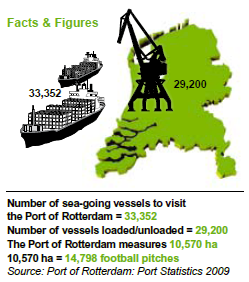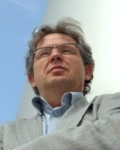Knowledge – Port of Rotterdam’s Precious Cargo
By Catherine Walker

Bart Kuipers
The dominant production factors for sea ports have shifted significantly over the years, says Bart Kuipers of the Erasmus School of Economics. First it was muscle, then it was capital, and now it’s knowledge. Together with Albert Veenstra, assistant professor at RSM’s Department of Decision and Information Sciences, Kuipers is co-ordinating ‘Erasmus Smart Port Rotterdam’ – designed to bring that all-important knowledge direct to where it can best be used.
This centre of excellence for maritime and port-related research and education was launched in 2009, building on strong relationships between Erasmus University (EUR) and the Port of Rotterdam and with many of the companies linked to it – both in the Port’s container centre and within the city itself.
What’s new about the Smart Port initiative is that it draws together research expertise from five EUR schools – involving more than 40 researchers – and brings them into partnership with key stakeholders within the Port and related industries (see panel).
‘That makes for a very multi-disciplinary community,’ says RSM’s Veenstra, ‘and it enables us to offer a much better proposition to the Port. We want to build on existing business contacts but extend that network to include a broader set of companies, including Small and Medium Enterprises (SMEs).’
‘Our goal is to be the main knowledge partner of the Port and industrial complex here in Rotterdam, and to be the educator of choice,’ says Kuipers. ‘It’s all about increasing the attractiveness of the Port of Rotterdam region as a place to do business, by ensuring excellent connections with the knowledge institutes.’
A world class port
It’s a message welcomed by Henk de Bruijn, Corporate Strategy Manager at the Port of Rotterdam: ‘We have a world-class port and will be investing millions of euros over the next decade because it’s important for our customers that we make Rotterdam the best port in the world.
‘We know we have stiff competition in western Europe – from Hamburg and Antwerp, for example. That’s why we also need world-class research and students, and to put a lot of effort into social and R&D activity. Smart Port has the potential to achieve all these things,’
A vital part of the centre’s responsibility is to ensure that EUR’s research agenda matches the needs of the Port and those working within it. Although specific projects are still being defined, Veenstra and Kuipers see the Smart Port research as falling into three broad strands:
Global – examining the Port’s role in global economic structures and its position within global networks and supply chains
Local – analysing the development of the Port in relation to local networks and institutions: the city, region and surrounding municipalities. This will include important aspects of port economics and governance.
Facilitating industry – looking at business clusters within the Port and the dynamics involved, how those companies compete, how they develop innovation, etc.

Albert Veenstra
One example of how the research will benefit industry, says Veenstra, is current work to determine potential efficiencies in cargo handling and trans-shipment: ‘A large part of our current research is about developing sustainable hinterland networks – finding a suitable split between barge, rail and truck and considering all kinds of measures to make the interchange between those different modes more efficient for the Port. So there’s a very relevant link between priorities on the business side and the type of research we can execute and translate into ready solutions for the business community.’
Another pressing concern for De Bruijn and the Port Authority is to develop a long-term vision and strategy for the Port, especially with the current uncertainties over Europe’s future economic performance. ‘If one assumes growth, that has repercussions for infrastructure development and capacity needs,’ says Veenstra.
 ‘If, on the other hand, one expects that over the long term the European economy will not grow, that presents an entirely different picture of how the Port may operate. What is a realistic and sustainable growth scenario? And what will that mean for the Port’s capacity requirements, in terms of cargo handling?’
‘If, on the other hand, one expects that over the long term the European economy will not grow, that presents an entirely different picture of how the Port may operate. What is a realistic and sustainable growth scenario? And what will that mean for the Port’s capacity requirements, in terms of cargo handling?’
That’s why De Bruijn and his colleagues from the Port Authority are already in discussions with leading international economists from the participating EUR schools, including RSM.
Education is also an important priority for Smart Port. ‘We want to play a very active role in executive education,’ says Kuipers. ‘There’s a large demand from companies to coach their existing workforce in new concepts – and the Port is also dealing with the problem of an ageing population, making lifelong learning very important.’
The team is already planning how to adapt and add to existing Bachelors and Masters programmes to prepare the next generation of Port executives. ‘We want to offer them a multi-disciplinary background because problems within the Port are seldom mono-disciplinary. We’d very much like to broaden their mindset in terms of port issues,’ explains Kuipers.

Henk de Bruijn
Looking ahead, De Bruijn is confident the new centre will bring the Port of Rotterdam multiple benefits – creating greater awareness at EUR, and the schools individually, of the career and research opportunities within the Port, increasing access to EU and other research funding through collaborative bids, and enabling SMEs – a crucial part of the port economy – to be brought into closer contact with EUR, RSM and the other participating schools.
But above all, he believes that bringing together professionals from Port and University will help unlock new ideas and innovations that will be important for ensuring the future direction of the Port of Rotterdam and increasing its profitability.
More information can be found at www.eur.nl/smartport
Participating Schools:
- Rotterdam School of Management
- Erasmus School of Economics
- Erasmus School of Law
- Public Administration, Faculty of Social Sciences
- Faculty of History and Arts
Smart Port Partners:
Article adapted from RSM Outlook Winter 2010.

